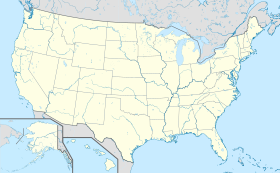Empire State Plaza
| Type | |
|---|---|
| Fondation | |
| Styles | |
| Architecte | |
| Ouverture | |
| Propriétaire | |
| Site web |
| Localisation |
|---|
| Coordonnées |
|---|
L'Empire State Plaza est un complexe de bureau située à Albany dans l'État de New York. Il a été construit en 1965 et 1976. Il intègre une grande partie de l'administration de l'État de New York et il est situé à proximité du Capitole de l'État de New York. Son architecte principal est Wallace K. Harrison après une idée de Nelson Rockefeller. Le complexe est d'architecture brutaliste.
Architecture[modifier | modifier le code]

L'Empire State Plaza comporte plusieurs bâtiments en acier et béton armé, recouvert de pierre (excepté The Egg, qui expose sa structure de béton)[1].
L'utilisation d'immeubles de formes géométriques abstraites est censée représenter le concept de Rockefeller d'une architecture semblable à de la sculpture[2].
Les immeubles constituant la plaza sont :
- les quatre bâtiments fédéraux (numérotés "Agency 1" à "Agency 4")
- L'Erastus Corning Tower
- The Egg (en), une salle de spectacles
- Le Cultural Education Center (en) (New York State Museum, bibliothèque fédérale et archives)
- Le Robert Abrams Building for Law and Justice (ou Justice Building), avec les architectes Sargent, Crenshaw, Webster et Folley
- Le Legislative Office Building (LOB), avec les architectes James, Meadows, Howard
- Le Swan Street Building, avec les architectes Carson, Lundine et Shaw.
-
Immeubles Agency 1 à 4 -
Justice Building -
Bureaux de la Législature d'État de New York -
Panneau indicateur
Références[modifier | modifier le code]
- Robert H. Fickies, « Building Stones of the Empire State Plaza: A Walking Tour » [archive du ], sur New York State Museum, New York State Geological Survey (consulté le )
- Rockefeller in Retrospect : The Governor's New York Legacy, Albany, N.Y., Nelson A. Rockefeller Institute of Govt., , 309 p. (ISBN 0-914341-01-4, OCLC 11770290), « The Builder », p. 90
« In a deeper sense, art and architecture have a much more intimate relationship. For him, art and architecture often blurred, and there is no doubt that on one plane of consciousness, Rockefeller perceived the outer shell of buildings as sculpture.
The Mall here in Albany, for instance, can be characterized as a group of forms on a platform – sculpture on a pedestal, if you will. »
Bibliographie[modifier | modifier le code]
- Matthew Bender, Albany Architecture : A Guide to the City, Mount Ida Press, , 278 p. (ISBN 978-0-9625368-1-6, lire en ligne), p. 81









